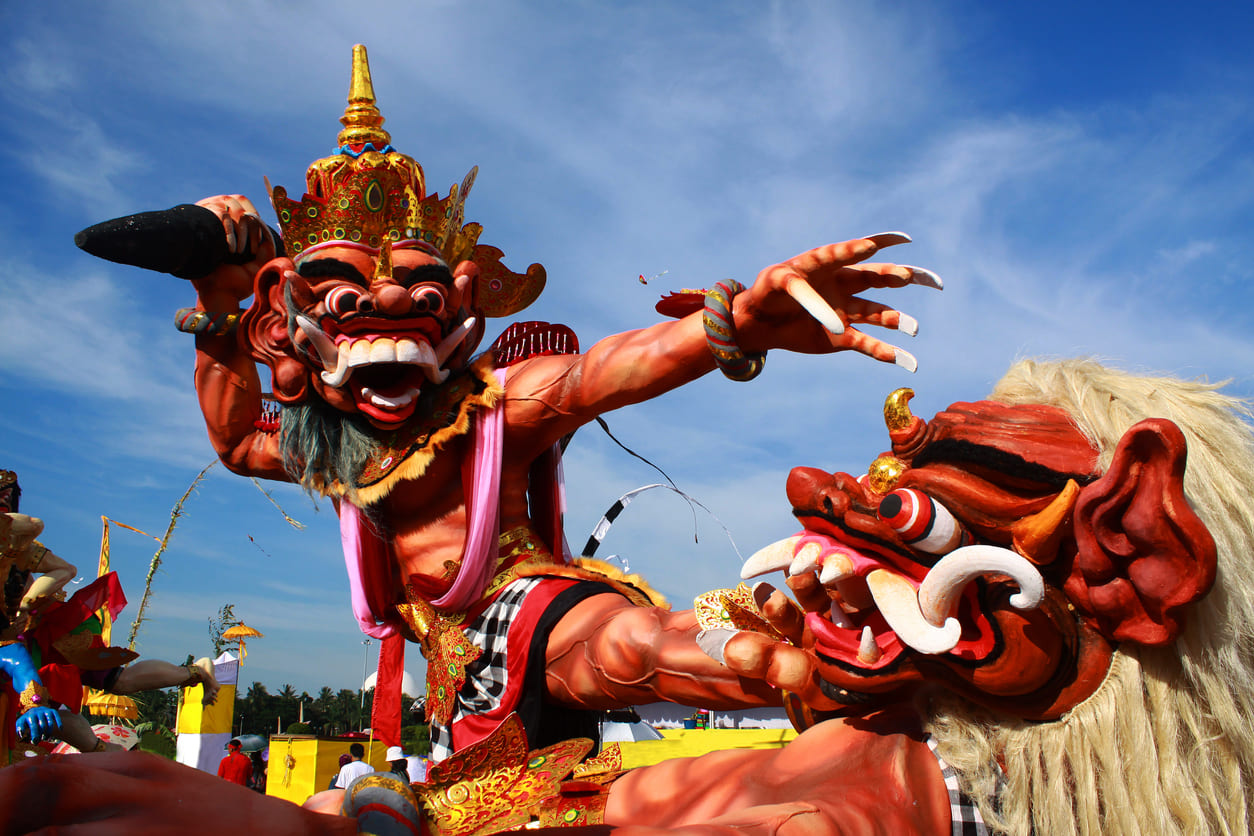Dates of Nyepi in Indonesia
| 2026 | Mar 19 - Mar 20 |
| 2025 | Mar 28 - Mar 29 |
| 2024 | Mar 11 - Mar 12 |
Indonesia Holiday Calendars
Nyepi, the Balinese Hindu New Year, is a day of complete silence, reflection, and self-restraint observed across Bali. The island comes to a standstill, with no travel, work, or entertainment, as people dedicate the day to meditation and spiritual renewal.
Nyepi: A Public Holiday?
Nyepi is a national public holiday in Indonesia, with government offices, schools, and most businesses closed, especially in Bali, where the day is marked by complete silence and strict public restrictions.
The holiday is often extended with additional days of Collective Leave (Cuti Bersama), a government-designated leave deducted from public servants' overall entitlement. Many businesses adopt this practice, adjusting employees' annual leave by official guidelines.

Nyepi
Nyepi, also known as the Balinese Day of Silence or Hari Raya Nyepi, is the Balinese Hindu New Year and a deeply spiritual day rooted in ancient Balinese traditions. It follows the Saka lunar calendar, which was introduced to Bali by Hindu influences from India around the 9th century. The observance of Nyepi aims to bring balance and harmony to nature, marking the transition into a new year with a focus on purification and renewal. Traditionally, it is believed that on this day, evil spirits roam the earth. By observing complete silence and inactivity, the island appears deserted, which is thought to discourage these spirits from lingering.
Over time, Nyepi evolved into a profound cultural and religious practice that defines Bali's unique identity. While the festival has ancient roots, it has been preserved and adapted through generations. In modern Indonesia, Nyepi is not only a Balinese event but also recognized nationally as a public holiday. It serves as a symbol of respect for Bali's rich cultural heritage and promotes harmony across the diverse communities of Indonesia.
Observance of Nyepi in Indonesia
Nyepi is one of the most distinctive celebrations in Indonesia. The observance begins the night before with the vibrant Ogoh-Ogoh parade, where large paper-mâché figures representing evil spirits are displayed and later burned to drive away negativity. This is followed by the Day of Silence, when Bali comes to a complete halt. From sunrise to the following morning, no one is allowed on the streets, the airport shuts down, and even lights are kept low. People stay at home, dedicating the day to prayer, meditation, and self-reflection.
The restrictions during Nyepi are strict. No travel, entertainment, or work is permitted, and even electricity use is minimized. Visitors to Bali are also required to respect these rules. This period of quiet creates a rare opportunity for personal introspection and collective calm. Many Balinese use this time to reconnect with their spirituality and reflect on the past year.
Nyepi carries deep cultural and environmental importance. It fosters mindfulness, encourages environmental awareness by reducing pollution for a day, and reinforces social harmony. The festival unites the community in a shared experience of peace and renewal. In today's fast-paced world, Nyepi's practice of collective pause offers valuable lessons on balance, respect, and spiritual well-being that resonate far beyond Bali.
Nyepi Observances
| Year | Date | Weekday | Name | Holiday Type |
|---|---|---|---|---|
| 2024 | Mar 11 | Mon | Nyepi | Public Holiday |
| Mar 12 | Tue | Nyepi Holiday | Collective Leave | |
| 2025 | Mar 28 | Fri | Nyepi Holiday | Collective Leave |
| Mar 29 | Sat | Nyepi | Public Holiday | |
| 2026 | Mar 19 | Thu | Nyepi | Public Holiday |
| Mar 20 | Fri | Nyepi Holiday | Collective Leave |



